Monotheism (belief in one God) in the ancient world

Monotheism is simply defined as belief in one God, and is usually seen as the opposite of polytheism or belief in many gods. The word monotheism is a relatively recent word coined by the British philosopher (Henry Moore 1614-1687 AD) in the middle of the seventeenth century AD. It comes from the Greek words (mono meaning one) and (theos meaning god). In the Western tradition, “monotheism” refers specifically to the God of the Bible. God of Judaism, Christianity and Islam. However, the concept of monotheism did not exist in the ancient world as we understand it today. The ancients were all polytheists. They may have revered one deity more than another (henotheism), but they recognized the existence of divine pluralism.
According to the ancients, the concept of the universe is divided into three worlds: the heavens (the heavens); the earth (human beings); and the underworld (sometimes known as "the land of the dead"). Heaven was the domain of the gods and contained a group of deities with a hierarchy of powers. Many ancient civilizations had a dominant deity or king of the gods, with other deities responsible for various aspects of life, serving as advisors at court, or simply messengers to humans.
Many of these forces can cross over to Earth in various manifestations. They could also travel to the underworld, and these manifestations were known as chthonic (power of the underworld). Some of the lesser deities were seen as evil and were known as demons. These powers are believed to be able to possess people and serve as an explanation for illnesses and mental disorders.

Creation.Photo: Fr Lawrence Lew, OP (CC BY-NC-ND)
Faith, Belief and Creed
The modern concept of monotheism presupposes the existence of two other concepts, “belief” and “faith”. The reason religions were so difficult to understand in ancient times was not because they did not believe in things or lack of faith in gods, but rather they did not often express or show that in the way we assume today in our religious systems. In contrast to the later beliefs of Christianity, there were no similar beliefs among the different ethnic sects in the Mediterranean basin.
A similarity and similarity of knowledge was found in the works of Homer “The Iliad and the Odyssey” and the works of (Hesiod) “Theogony; Works and days» and the myths of poets as the basis for stories of creation, gods and heroes. There was no central authority (such as the Vatican) to dictate conformity in beliefs and practices. Each ethnic group developed rituals and practices necessary for worship (such as offerings) that were passed down from the ancestors to their descendants from their gods. It was very important to carry out this ritual without errors.
The ancient roots of monotheism
Due to the novelty of the term monotheism itself, scholars have attempted to uncover the ancient roots of monotheistic beliefs in the ancient world. At the top of the list was the Egyptian pharaoh (Akhenaten 1353-1336 BC), who is often referred to as the first monotheist. During the Amarna period, Akhenaten promoted the worship of Aten, the symbol of the sun, as the highest form of worship, and abolished the worship of Amun in Luxor, which was the dominant deity at the time. However, the attempt to destroy Amun's temples, images, and priesthood indicates belief in the existence (and influence) of this god. At the same time, there is no evidence that Akhenaten persecuted or attempted to eradicate other gods from the Egyptian religions, nor did he attempt to abolish many religious festivals or afterlife beliefs across Egypt.
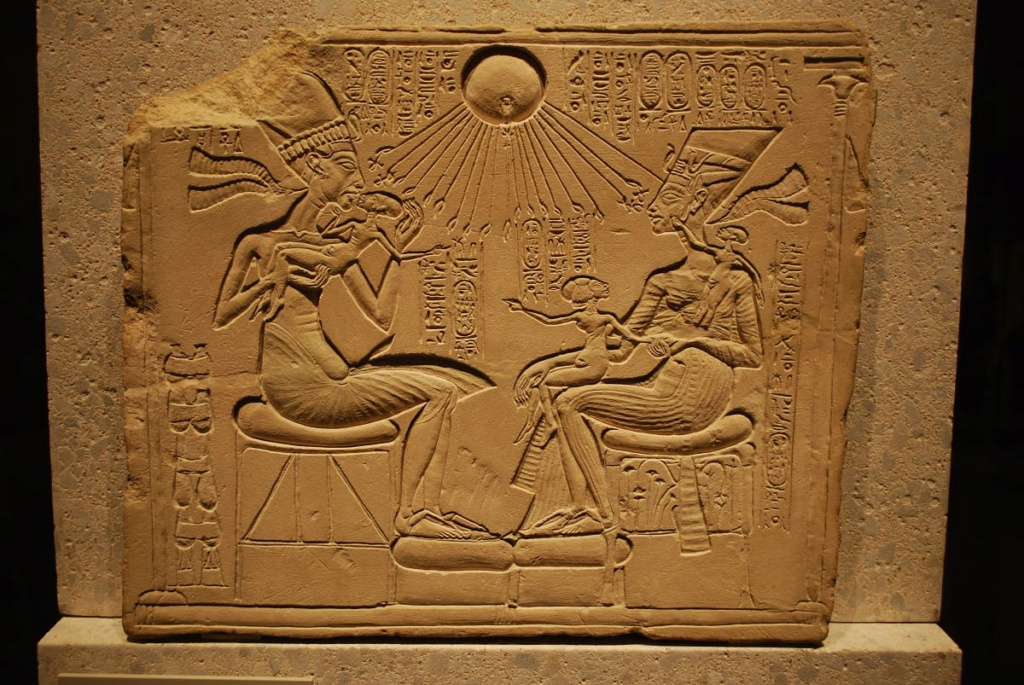
Akhenaten and the royal family blessed by the Aten. Image: Troels Myrup (CC BY-NC-ND)
Another source for the roots of ancient monotheism can be found in Zoroastrianism which was the common denomination of ancient Persia. Zoroaster was a prophet (from 1000-600 BC) who promoted the worship of one God (Ahura Mazda), the sole creator of everything at the time. However, from Ahura Mazda came the six Amesha Spentas (spiritual forces) in addition to the Yazatas (other abstract forces) and in their entirety represented the extreme opposite of other forces (such as the contrast between good and evil). The antithesis of Ahura Mazda was druj or "chaos", personified in the person of Angra Mainyu.
As such, the existence of a force opposed to creation eventually gave rise to later Jewish, Christian and Islamic concepts of "Satan". Despite the apparent contradiction between pure good and pure evil (or a concept known as dualism), modern Zoroastrians claim to be the true originators of monotheism, in which everything arose from the One.
Ancient Judaism continues to receive the greatest amount of attention as being credited with creating the origins of monotheism in the Western tradition. Recently, some researchers have called the term “monolatry”, a system that recognizes the plurality of gods but does not allow the worship of more than one god. Just like their neighbors, the ancient Jews envisioned a hierarchy of heavenly powers: “sons of God” (Genesis 6), angels and archangels (God’s messengers who communicate God’s will to humans), and (cherubim and seraphim). The Jews also considered the existence of demons, with many examples in the Gospels about the role of (Jesus) in exorcising evil spirits.
Scholars have long tried to analyze what came in Genesis 1:26: “And God said, ‘Let us make man in our image, after our likeness.’” So, to whom is God speaking? Does the relative pronoun “our” refer to the pronoun “we”? The proposals emphasized ancient and comparable ideas in ancient cultures that the heavens reflected earthly societal structures; Just as the kings had a court of advisors, there was also a heavenly court.
The idea that the Jews were monotheistic goes back to the story of the Prophet (Moses) when he received God’s commandments on Mount Sinai: “I am the Lord your God, and you shall have no god but Me.” In fact, this Hebrew utterance can be translated by saying, "There are no other gods with Me." This does not indicate that there are no other gods; It is a commandment so that the Jews do not worship any other gods. Worship in the ancient world always meant offerings. Jews could pray to angels and other powers in heaven, but they were content to make offerings to the God of Israel.
Jewish scriptures consistently refer to the existence of gods of nations (ethnic groups): Deuteronomy 6:14 (“You shall not follow other gods than the gods of the nations around you,”); 29:18 (“Do you not have a man, a woman, a tenth, or a lump, the heart of his heart, on behalf of the Lord, to God.” 32:43 (“Praise, O heavens, his people, worship him, all you gods”); Isaiah 20:36 (“Which of all the gods of these lands has delivered their land out of my hand, that the Lord should deliver Jerusalem out of my hand?”); Psalm 821 (“God presides over the great assembly, and issues judgments against the gods”). In the story of the Exodus of the Jews from Egypt, God battles the gods of Egypt to show who controls nature. Which would be meaningless if their existence had not been acknowledged: “… I will rule over all the gods of Egypt.” (Exodus 12:12)
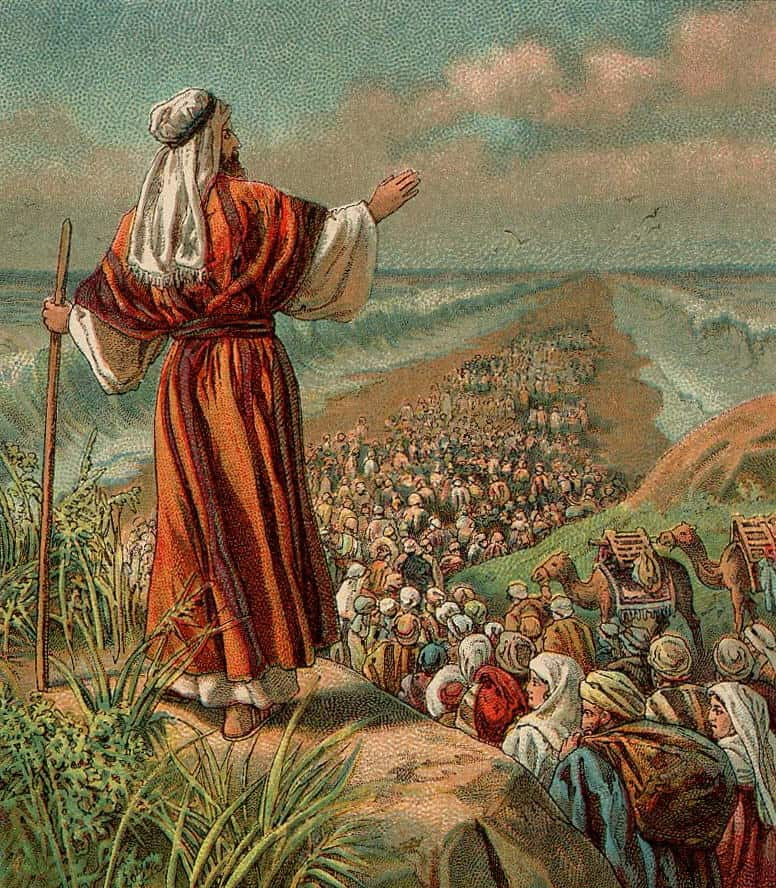
Moses and the parting of the Red Sea.Image: Providence Lithograph Company/Public Domain
While the Jews made nothing but offerings to the God of Israel, they shared one conviction that all gods should be respected; It was dangerous to anger the other gods. He commanded (Exodus 28:22) the Jews not to insult the gods of the nations. With the Romans destroying the Jewish Temple in Jerusalem in AD 70, religious sacrifices were no longer permitted. Subsequent leaders of Judaism, the rabbis, began a long process of reinterpreting worship as a focus on the "One", which would lead to the final concept of the existence of only one God in the universe.
Under persecution by the Seleucid Greeks (which led to the Maccabean Revolt in 167 BCE), it was believed that those who died for refusing to worship the Greek gods would be immediately rewarded by being transported to heaven for eternity near their God as martyrs.
Philosophical monotheism
With the advent of Greek schools of philosophy in the year 600 BC in the city of Miletus in Asia Minor, philosophical speculations regarding the universe and man's place in it began to spread throughout the Mediterranean basin. Many philosophers gathered around them students (disciples), and these students often wrote the teachings down and passed them on to the next generation. Philosophy was also associated with the upper classes, as only the rich had the time or leisure to devote to this type of higher education. However, philosophy was not just speculation from an ivory tower, but was like the ancient religion, taught the way of life, and provided moral and spiritual explanations.
The schools of Plato, Aristotle, and the Stoics provided ways to deal with the vicissitudes of life, as they cared more about one's spiritual condition than with worldly externalities. The focus was on the soul's return to its origins in the higher realm after death to reunite with the "Supreme God". For Plato, this supreme deity was not a creature, nor was he subject to change, but a pure substance (inseparable from mortal matter). Realistic abstractions emanated from the mind of God, like the light from a candle. From this deity also emanate the word of God, or the principles of wisdom, which regulate the material world.
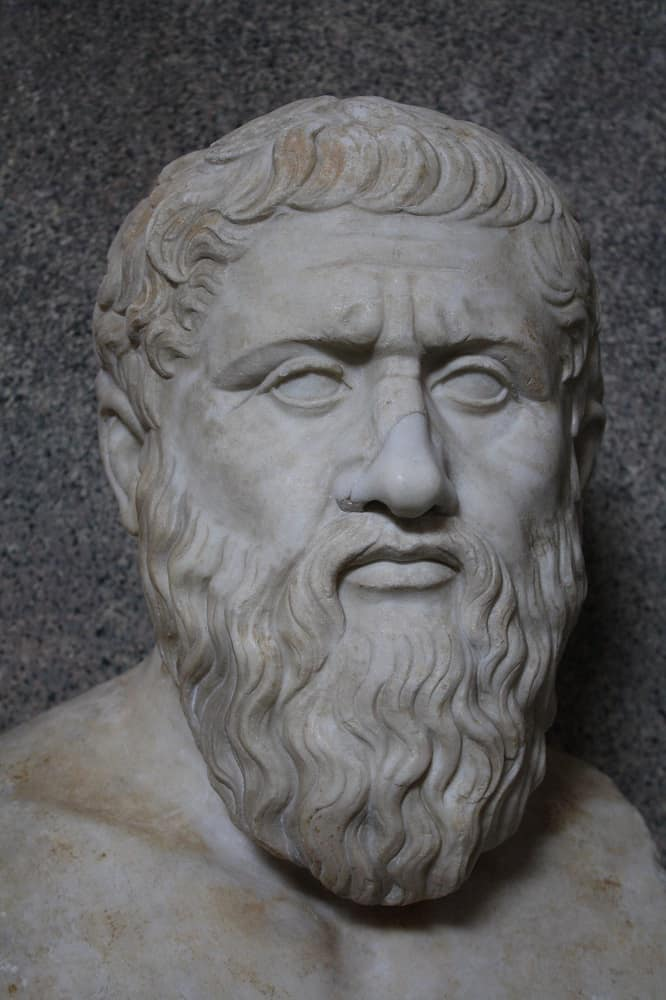
Plato.Image: Mark Cartwright (CC BY-NC-SA)
Aristotle (384-322 BC) dealt with metaphysics or the existence of primary principles. The supreme deity is the first, the “unmoving mover” who causes the planets and galaxies to move. The universe as a whole was for the Stoics a single living being energized by an imminent divine rational force that ordered the universe according to natural law. They taught people to accept both good and bad, and required self-discipline to achieve final harmony with this divine power.
Many schools criticized traditional Greek mythology that personified the gods (assigning human characteristics to the gods), although very few schools condemned traditional sacrifices or called for the elimination of traditional rituals. Philosophy through their writings contributed to the eventual monotheistic views of both later Christian theologians and rabbis.
Christianity
Paul's letters (50-60 AD) were our first evidence of the existence of Christian groups, as they show the same Jewish recognition of the forces of the universe. Acceptance was given to many manifestations of gods that appeared with the same degree of power, but only the God of Israel was worshiped: “And if there are in heaven or on earth what people claim to be gods, but there are many of these gods and lords, then we have one God and He is the Father who From him are all things and to him we return, and there is one Lord, Jesus Christ, through whom are all things and through whom we live.” (1 Corinthians 8:5). Often (Paul) criticized other gods who hindered his message (2 Corinthians 4:4). “In whom the god of this age has blinded the minds of the unbelievers, so that the light of the gospel of the glory of Christ, whose image is God, may not shine upon them.”
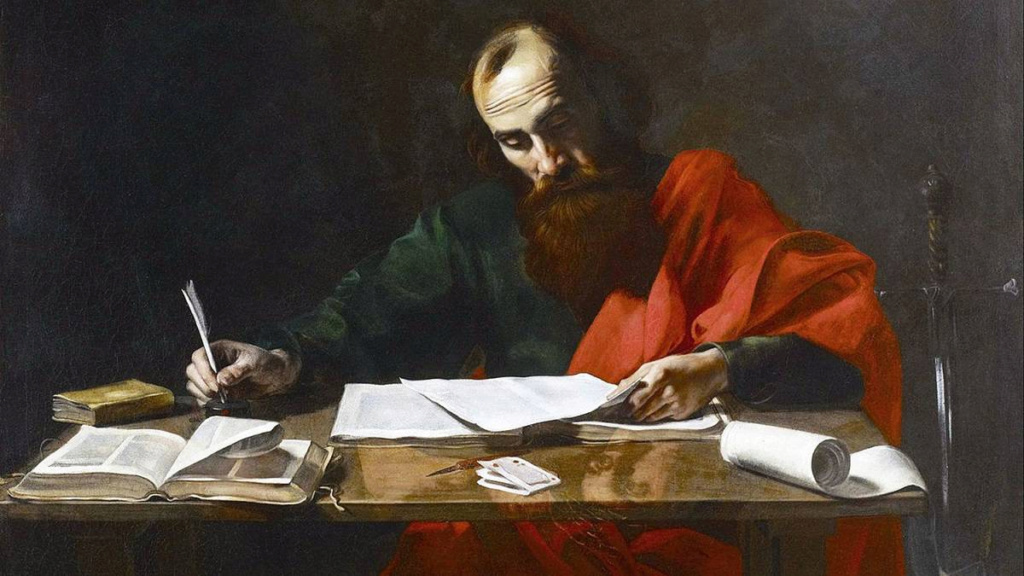
Paul the Apostle
However, early Christianity became a complex religion with regard to the concept of divine oneness, especially after the new concept was introduced. Christians began (following the post-Passover experiences of the apostles), claiming that, in parallel with Jesus' resurrection from the dead, he was "lifted up" to heaven and given a seat "at the right hand of God" (Acts 7:56). First Peter 3:21-22 states: “By the resurrection of Jesus Christ, who is at the right hand of God, having gone into heaven, and angels and authorities and powers in action.
The first followers of Jesus agreed with the dictates of the Jews that it was not possible to offer sacrifices to anyone other than the God of Israel, and they remained on that until the destruction of the Temple in Jerusalem. We also know that the early followers were beginning to include other pillars of worship in relation to Jesus and these included: baptizing people in the name of Jesus; curing and casting out demons in his name; and expanding the concept of forgiveness of sins in his name; In addition to prayers and hymns addressed to Jesus.
An early hymn recited by Paul is found in Phil. 2:5-11.
Have this mind in you, which was also in Christ Jesus:
Who, being in the form of God, did not consider it robbery to be equal with God. But he emptied himself, taking the form of a slave, becoming in the likeness of men. And being found in human form, he humbled himself and became obedient even to death, even death on a cross. لِذلِكَ رَفَّعَهُ اللهُ أَيْضًا، وَأَعْطَاهُ اسْمًا فَوْقَ كُلِّ اسْمٍ لِكَيْ تَجْثُوَ بِاسْمِ يَسُوعَ كُلُّ رُكْبَةٍ مِمَّنْ فِي السَّمَاءِ وَمَنْ عَلَى الأَرْضِ وَمَنْ تَحْتَ الأَرْضِ، وَيَعْتَرِفَ كُلُّ لِسَانٍ أَنَّ يَسُوعَ الْمَسِيحَ هُوَ رَبٌّ لِمَجْدِ اللهِ الآبِ.
The phrase “that every knee should bow at the name of Jesus” means that we must worship, which is an ancient concept of bowing before images of various deities. In the Gospel of John, the idea that Jesus pre-existed in heaven before his appearance as a human being on earth is reinforced, beginning with the claim that Jesus is the Word of God incarnated to teach us about God and salvation. This idea was later announced by the resurrection of Jesus.
The path to the Trinity
When the former pagans converted to Christianity, they adopted the Jewish concept of refusing to worship other gods. This led to their persecution, as this was considered a betrayal of the Roman Empire. Not appeasing the gods means not wanting the prosperity of the empire and thus bringing disaster. Treason was always a capital offense, and so Christians were executed in the squares.
Many Christian writers implored the emperors to make an exception for them by making traditional sacrifices, as had the Jews before them (under Julius Caesar). Christians claimed that they were the "true Jews" and had no new religion, using symbols to prove their ancient connections in the Jewish Bible. Everywhere God is mentioned, they said, He was in fact a pre-existing form of Christ. So they are technically like the Jews, they only worshiped one God. But Rome's response was always that Christians are not circumcised and therefore not Jews.
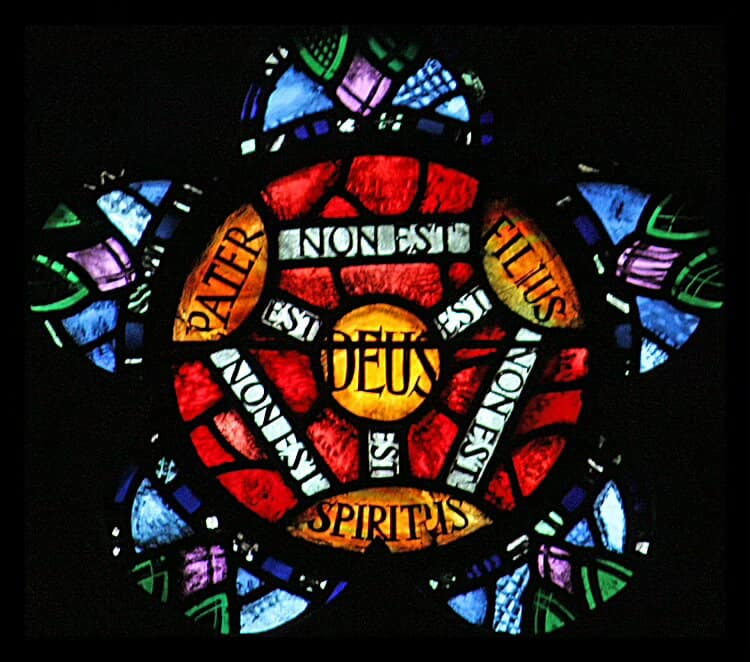
Holy Trinity.Photo: Fr Lawrence Lew, OP/OP (CC BY-NC-ND)
Emperor (Constantine) in the year 312 AD became a Christian and legalized the Christian religion, thus stopping the persecution. Nevertheless, Christian thinkers continued to discuss the relationship between God and Jesus. Arius, an elder of the church in Alexandria, began by saying that if God created everything in the universe, then he must have created Christ at some point in time. This means that Christ was subordinate to God. His words led to riots in Alexandria and other cities belonging to the empire.
(The First Council of Nicaea) met to resolve this issue. They concluded that God and Christ are identical in essence and that Christ was a manifestation of God Himself on earth:
From all seen and unseen we believe in one God, the Father, Almighty, Creator of heaven and earth. We believe in one God, Jesus Christ, the only begotten Son of God, eternally begotten of the Father, God from God, Light from Light, true God from true God, begotten, not made, one in existence with the Father. He created everything. For us men and for our salvation he came down from heaven: by the power of the Holy Spirit he was born of the Virgin Mary and became man. . . We believe in the Holy Spirit, who is the Lord and giver of life, coming from the Father and the Son. With the Father and the Son worshiped and glorified.
The Creed was revised several times over the following decades, and an abbreviated version became popular and is known as the Apostles' Creed. The concept of the Trinity claims that God remains one, but with three manifestations or personalities: God, Christ, and the Holy Spirit.
By assimilating Jewish and Greek ideas, Christians began to gather at the tombs of the martyrs to petition them in the form of prayers. The growing cult of saints combined the Jewish reverence for martyrs and the ancient Greek reverence for heroes, as people gathered at the tombs of heroes and were blessed by them. The Greco-Roman concept of patron deities of a particular ethnic group or town was assimilated into the concept of heaven-based Christian saints who became mediators between God and men.
Islam
In the sixth century AD, a prophet appeared in Saudi Arabia and his name was Muhammad, who is the founding prophet of Islam. He was basically a reformer who claimed that false teachings had corrupted both Judaism and Christianity. He emphasized the oneness of God using the Jewish writings. He said that the combination of God and any other power is "shirk" equivalent to idolatry. However, Islam recognizes the gradation of powers.

Inside Hagia Sophia. Photo: Mark Cartwright/(CC BY-NC-SA)
God created three kinds of intelligent beings: angels, jinn (equivalent to devils), and humans. Angels do not have free will (they are pure reason) and therefore do not sin, but jinn and humans can choose between good and evil. When God created Adam, he commanded all the angels to prostrate to him, and they all prostrated except for Iblis (Satan), who refused to do so and was cast into Hell. God has authorized him to tempt people, but his influence will end on the Day of Resurrection.
After Muhammad's death, his followers split into two main groups over the succession. Those who supported his son-in-law (Ali) became Shiites, while the majority identify as Sunnis. The Shiites honor their great teachers, the imams, and perform the same type of pilgrimage and the same rituals in their tombs. Sunnis claim this equates to Christians' veneration of saints and threatens the oneness of God.
Many elements over the centuries have contributed to what would eventually become the modern Western concept of monotheism. But the paradox lies in declaring the oneness of God, even though we realize that God is not one.
Source:websites

